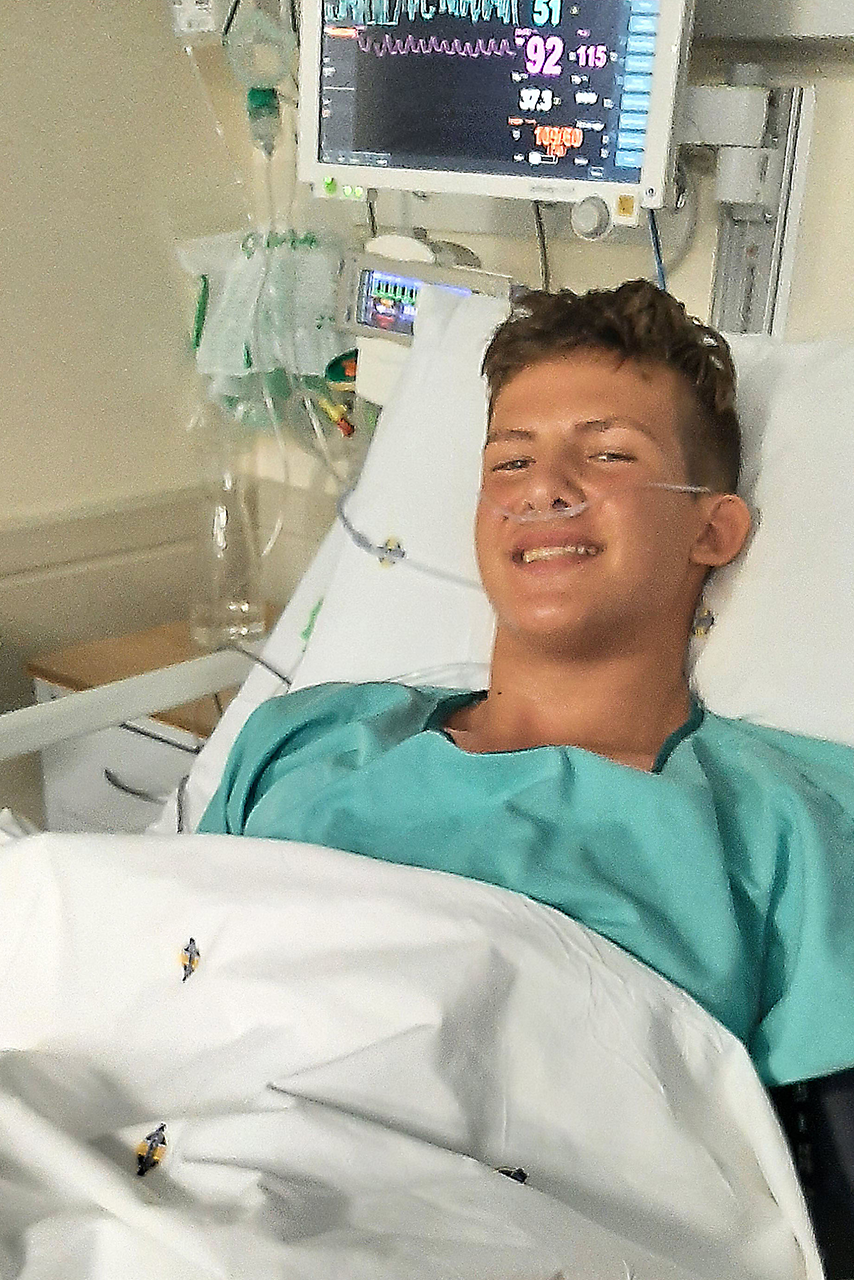Young man defies the odds to overcome severe heart injury
Life-saving collaboration: Strategic multi-disciplinary approach to near-fatal pellet gun wound
Just a few millimetres of muscle – that was all that stood in the way of a fatal injury for a talented school rugby player. That and a carefully considered, multidisciplinary approach to the heart surgery that would have him back in class and training once more within a matter of weeks.
Ian Venter, an active 15-year-old from Fochville, is just like any other sporty youngster who loves the outdoors, playing team sports and spending time with friends, but after an accident with a high velocity pellet gun, Ian suddenly found himself fighting for his life.
Dr Elias Zigiriades, a cardiothoracic surgeon practising at
Netcare Krugersdorp Hospital, explains that the tiny bullet from the pellet gun had gone through Ian’s breastbone, penetrating two chambers of his heart and missing his coronary artery by less than a centimetre before stopping just outside the right ventricle – the chamber responsible for pumping blood to the lungs for oxygenation.
“It was remarkably lucky that the pellet had entered Ian’s chest where it did, as the chances of saving his life could have been significantly reduced. As it was, his heart had already undergone considerable trauma, and because the pellet was so small and its location was not immediately easy to identify, we had to tread with caution,” he says.
With the operating team on standby, Dr Zigiriades worked with a radiologist and cardiologist to conduct a CT angiogram – a non-invasive scan – which allowed them to create a 3D representation of Ian’s heart to locate the tiny pellet, which had done a surprising amount of harm.
“We were astonished at just how deep an impact that little pellet had made. While we could see areas of damage that it had caused, it was difficult to ascertain whether it had stopped inside or outside the muscle wall. Ian’s treatment had already been delayed by an unfortunate series of events, with the emergency services provider taking him to a different hospital before he was ultimately referred to us. Though he was stable, by the time he arrived at Netcare Krugersdorp Hospital, it was crucial for his injury to be promptly addressed.”
Ian’s mother, Teresa, recalls the sense of dread she felt at hearing that Ian would have to undergo open heart surgery. “Accidents happen, especially with kids, but I never thought that my fit and healthy son would be going in for a procedure like this. But, as Dr Zigi explained, there was no more time to lose and I am of course so glad that he acted when he did,” she says.
According to Dr Zigiriades, only once Ian was in theatre could the two most astonishing discoveries around his injury be made.
“Firstly, once I had begun to operate, we saw that there was an enormous amount of blood surrounding Ian’s heart – about 800ml to 1 litre – that needed to be drained. Most patients are already very unstable at around the 200ml mark, so the fact that Ian had even made it this far was quite remarkable,” he points out.
“It was also at this time that we could see how close the pellet had come to Ian’s coronary artery. Ian would never have made it here if it had hit that artery. He must have had a few guardian angels watching over him.
“Given how much damage that tiny pellet had already caused, our anaesthetist also conducted a transoesophageal echocardiogram during the procedure to assess whether any damage had occurred to the heart valves. This is a special scan done with a tube via the throat that uses sound waves to assess the functioning of the heart,” he explains.
Fortunately, however, Dr Zigiriades and the team had, by this stage, uncovered the full extent of the damage. Once the pellet was removed and the tears repaired, Ian was transferred to the hospital’s cardiothoracic intensive care unit. There, he began the recovery process under the watchful eye of the unit’s experienced and skilled nurses. By the following morning, he was already sitting in a chair, and within six days, he was ready to be discharged.
“Ian immediately began rehabilitation with the physiotherapist and bounced back quickly. His age and fitness level were very much on his side,” says Dr Zigiriades.
Teresa notes that the timing of Ian’s injury meant that he only had to miss a couple of days at the start of the school term, and aside from a brief hospital visit to have some fluid drained from his lungs – a common occurrence after open heart surgery – he has been in excellent health.
“In the beginning, Ian had to take it easy, and his school was very helpful in making special arrangements to help with his recovery, such as a locker closer to his classes so that he wouldn’t have far to go with his books. He started exercising daily to rebuild his muscle strength and condition, and he is now training for the next rugby season.
“We are so glad he is back to normal life – fishing, riding his bike and enjoying his sport. What happened gave us all a huge fright, but thankfully, he got just the care he needed and is now back preparing for his future,” she concludes.















